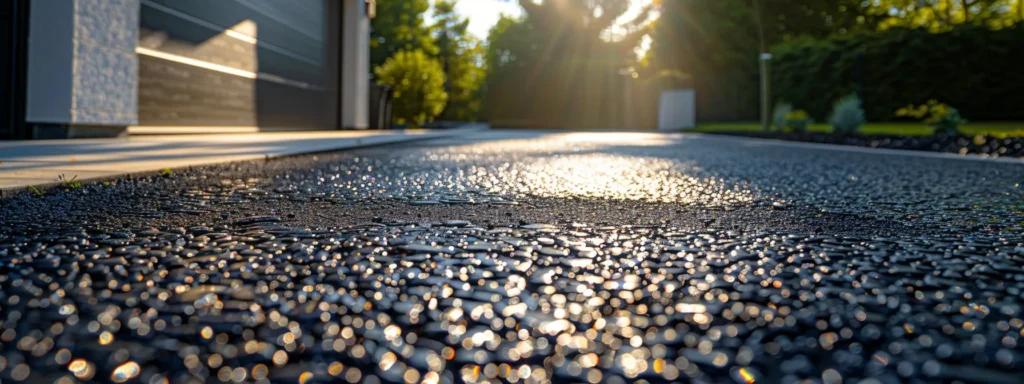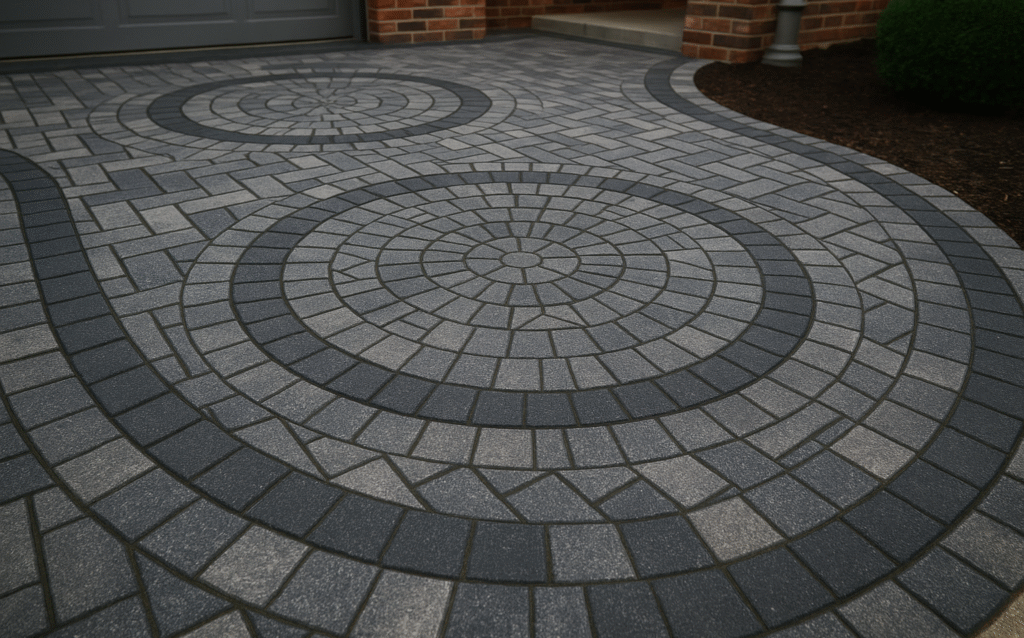Selecting materials for your residential driveway paving can significantly impact both the aesthetic appeal and functionality of your property. Many homeowners struggle to choose the right material that balances cost, durability, and drainage. This guide will examine common materials like concrete and residential asphalt driveways, highlight important factors to consider, and compare their advantages and disadvantages. By understanding these key points, readers will gain insights that can streamline their decision-making process and ensure they receive excellent customer service during their driveway project.
Key Takeaways
- Choosing the right paving material enhances both curb appeal and driveway functionality
- Regular maintenance, like sealcoating, extends the lifespan of asphalt driveways
- Concrete offers durability and aesthetic versatility for homeowners
- Proper site preparation is crucial for a successful driveway paving project
- Consulting professionals aids in selecting the best materials and ensuring compliance with local regulations
Understanding the Importance of Material Selection for Driveway Paving

Choosing the right materials for driveway paving is crucial for enhancing curb appeal and functionality. Different materials, such as asphalt and concrete, come with varying durability, maintenance needs, and aesthetic qualities. For homeowners exploring options like residential asphalt paving near me, understanding these differences can lead to better decision-making.
Another key aspect of material selection involves the long-term maintenance of the driveway. Sealcoat application can significantly extend the life of asphalt driveways, protecting against weather elements and wear. This proactive approach helps maintain the surface’s integrity and overall appearance while preventing costly repairs in the future.
The choice of paving material also impacts the property’s value and usability as parking lots or driveways. High-quality materials can ensure a smooth surface and prevent issues like cracking or pooling water. Therefore, selecting the appropriate material is essential for achieving a lasting, visually appealing landscape:
| Material | Benefits | Maintenance Needs |
|---|---|---|
| Asphalt | Durable, good for parking lot paving | Regular sealcoat application |
| Concrete | Long-lasting, aesthetic options available | Occasional resealing and crack repairs |
The choice of materials shapes the very essence of your driveway. Now, let’s explore the common options that can turn your vision into a reality.
Common Materials Used in Residential Driveways

Common Materials Used in Residential Driveways
Asphalt driveways are popular for their durability and affordability, while concrete driveways offer longevity and aesthetic versatility. Paver driveways provide a customisable look, enhancing curb appeal, and gravel driveways allow for effective stormwater management. Finally, brick driveways create a classic charm. Each option presents unique benefits, making it essential for homeowners to consider their specific needs in residential paving.
Asphalt Driveways
Asphalt driveways are a popular choice for homeowners seeking durable and cost-effective solutions. With a smooth surface that provides excellent traction, residential asphalt is ideal for both vehicle parking and landscaping purposes. Customers looking for residential asphalt repair near me can benefit from timely maintenance, addressing issues such as potholes and cracks before they escalate into larger problems. This proactive approach ensures the longevity and appearance of the driveway, making it a reliable option for many properties:
| Asphalt Driveway Features | Advantages | Maintenance Tips |
|---|---|---|
| Durable | Resistant to weather elements | Regular sealcoating |
| Cost-effective | Affordable installation | Quick pothole repairs |
| Good traction | Safe for vehicles | Routine inspections |
Concrete Driveways
Concrete driveways are renowned for their durability and versatility in residential paving projects. This material can be tailored to fit various design preferences, allowing homeowners to achieve a seamless look that complements adjacent features like patios and sidewalks. When engaging a paving company, it is essential to discuss not only the installation process but also the necessary masonry work involved, as proper reinforcement and finishing can greatly enhance the lifespan and aesthetic appeal of a concrete driveway.
Paver Driveways
Paver driveways are a popular choice among homeowners seeking a blend of style and functionality in their residential paving projects. These driveways offer a customisable appearance, allowing for various designs and patterns that can enhance the property’s curb appeal. When selecting a paving contractor, it’s essential to discuss installation techniques, as proper laying of pavers can prevent movement and ensure long-lasting results.
- Customisable design options for unique aesthetics
- Durable solution suitable for various climates
- Flexible maintenance requirements compared to other materials
Gravel Driveways
Gravel driveways offer a cost-effective and practical solution for homeowners looking for durability and easy installation. Known for their excellent drainage properties, gravel driveways effectively manage stormwater runoff, reducing the risk of pooling water that can damage other paving materials. Additionally, they provide flexibility in design and maintenance, making it simple for homeowners to repair or refresh the surface as needed:
| Feature | Benefits | Maintenance Requirements |
|---|---|---|
| Cost-effective | Lower installation costs compared to asphalt or concrete | Periodic replenishment of gravel |
| Good drainage | Helps prevent water pooling | Regular raking to maintain an even surface |
| Customisable | Options for various gravel types and colours | Weeding to keep the surface clear |
Brick Driveways
Brick driveways combine aesthetic appeal with durability, making them a popular choice for homeowners seeking a classic look. They offer numerous design possibilities, allowing for unique patterns that enhance curb appeal and can easily complement various architectural styles. However, it is important for homeowners to consider the initial installation cost, as brick driveways may require a higher investment compared to other materials, but their longevity and visual impact often justify the expense:
| Feature | Benefits | Maintenance Requirements |
|---|---|---|
| Aesthetic appeal | Classic look that enhances property value | Occasional cleaning and joint repairs |
| Durability | Long-lasting and resistant to cracking | Yearly inspections |
| Customisable design | Variety of colours and patterns | Replenishing sand between bricks as needed |
Choosing the right materials for your driveway is only part of the equation. Understanding the factors that influence this choice will lead to a solution that fits your needs and enhances your home.
Factors to Consider When Choosing Driveway Materials
Several factors play a crucial role in selecting materials for residential driveway paving. Homeowners must consider climate and weather conditions, as these influence material performance and longevity. Durability and maintenance needs will impact the overall upkeep, while cost and budget planning are vital for ensuring projects remain financially feasible. Additionally, aesthetic appeal should complement home design, and understanding installation time and processes can aid in project scheduling. Each of these aspects is essential for making informed decisions regarding driveway paving materials.
Climate and Weather Conditions
When selecting materials for residential driveway paving, understanding climate and weather conditions is essential. Different materials respond uniquely to temperature fluctuations, moisture, and exposure to the elements. For instance, asphalt can soften in high heat, while concrete may crack during extreme cold, making it vital for homeowners to choose materials that align with local climate challenges:
- Consider the extreme temperatures and weather patterns in the area.
- Evaluate the durability of materials under specific environmental conditions.
- Choose installation techniques that complement local climate to enhance longevity.
Durability and Maintenance Needs
Durability and maintenance needs are critical factors when selecting materials for residential driveway paving. Homeowners need to understand how different materials withstand wear and tear over time, as well as the upkeep required to keep them in optimal condition. For example, asphalt driveways require regular sealcoating every few years to protect against cracks and fading, while concrete driveways may need less frequent maintenance but can demand extensive repairs when significant cracks develop. Understanding these differences ensures that homeowners select a paving option that aligns with their lifestyle and maintenance capabilities:
| Material | Durability | Maintenance Needs |
|---|---|---|
| Asphalt | Durable but can soften in high heat | Regular sealcoating and crack repairs |
| Concrete | Long-lasting but may crack in extreme cold | Resealing and patching cracks occasionally |
| Pavers | Highly durable if laid properly | Minimal upkeep; occasional repositioning |
| Gravel | Durable with periodic replenishment | Regular raking and weeding |
| Brick | Highly durable and resistant to cracking | Annual inspections and sand replenishment |
Cost and Budget Planning
Budget planning is a critical factor in the selection of materials for residential driveway paving. Homeowners should thoroughly evaluate the initial costs of different paving options, such as asphalt, concrete, gravel, and pavers, alongside potential long-term expenses linked to maintenance and repairs. For instance, while asphalt may offer a lower upfront cost, it requires regular sealcoating, impacting overall expenditures; conversely, a concrete driveway might have a higher initial investment, but it can provide longevity and lower maintenance costs over time, ensuring a balanced approach to driveway improvement.
- Evaluate initial costs of paving options.
- Consider long-term maintenance and repair expenses.
- Balance between upfront investments and durability for cost-effectiveness.
Aesthetic Appeal and Home Design
Aesthetic appeal is a vital consideration when selecting materials for residential driveway paving, as the driveway serves as a prominent feature of a property’s exterior. Homeowners should choose materials that not only complement their home design but also enhance the overall curb appeal. For example, a modern home may benefit from sleek concrete or minimalist paver designs, while a traditional property might find greater charm in the classic look of brick or gravel, ensuring a cohesive and attractive outdoor space.
Installation Time and Process
Installation time and process are vital considerations when selecting materials for residential driveway paving. Different materials have varying installation timelines; for example, asphalt typically requires less time to install compared to concrete, which may need curing time before use. Understanding the installation requirements for each type enables homeowners to plan effectively, minimising disruptions to daily life while ensuring that the chosen driveway paving material aligns with their aesthetic and functional needs.
Every material has its strengths and weaknesses. Now, it is time to compare them and see what fits best for your driveway.
Comparing Driveway Materials: Advantages and Disadvantages
When evaluating driveway materials, homeowners should consider several critical factors including lifespan and longevity, environmental impact, ease of repair and maintenance, safety and traction, and the potential effect on property value. Each of these aspects plays a significant role in the decision-making process, guiding homeowners toward choosing the most suitable material for their driveway paving needs.
This section will explore the advantages and disadvantages of different driveway materials, helping homeowners make informed choices that align with their functional requirements and aesthetic preferences.
Lifespan and Longevity
The lifespan and longevity of driveway paving materials vary significantly, influencing homeowners’ choices during the selection process. Asphalt driveways typically last around 15 to 20 years, while concrete driveways can endure 25 years or more with proper maintenance. Understanding these differences helps homeowners prioritise durability and long-term value, ensuring their investment in driveway paving meets their practical needs and enhances property appeal over time.
Environmental Impact
The environmental impact of driveway materials is an important consideration for homeowners during the selection process. Asphalt, while durable, can contribute to runoff pollution if not managed properly due to its impervious nature. Concrete offers longevity but requires a significant amount of energy to produce, contributing to greenhouse gas emissions. In contrast, permeable options such as gravel or pavers can enhance stormwater management by allowing water to filter through, promoting groundwater recharge. For homeowners committed to sustainability, choosing eco-friendly materials is essential for minimising negative environmental effects while enhancing outdoor spaces:
- Asphalt: Durable but can increase runoff pollution.
- Concrete: Long-lasting with high production energy costs.
- Gravel/Pavers: Permeable options that support stormwater management.
Repair and Maintenance Ease
Repair and maintenance ease is a critical factor for homeowners when selecting materials for residential driveway paving. Asphalt driveways, for example, allow for straightforward repair methods, such as quick patching of potholes and regular sealcoating, making maintenance manageable and cost-effective. On the other hand, while concrete driveways are durable, they often require more involved repairs, including professional intervention for significant cracks, which can result in increased long-term maintenance efforts. Understanding these differences enables homeowners to choose a material that aligns with their maintenance expectations and lifestyle.
Safety and Traction
Safety and traction are critical factors to consider when selecting materials for residential driveway paving. Asphalt offers excellent traction, especially in wet conditions, reducing the likelihood of slips and falls. Concrete, while durable, can sometimes become slippery when wet, depending on its finish. Homeowners should prioritise materials that provide reliable traction to ensure the safety of vehicles and pedestrians:
- Asphalt provides superior grip, reducing slip hazards.
- Concrete may require textures or treatments to enhance traction.
- Paver and brick driveways can offer customisable surface finishes for improved safety.
- Gravel driveways provide a natural texture that prevents slips.
Impact on Property Value
The choice of driveway paving materials significantly impacts property value, as aesthetically appealing and durable surfaces contribute to overall curb appeal. For instance, high-quality asphalt or concrete can enhance a home’s visual appeal, making it more attractive to potential buyers. Furthermore, a well-maintained driveway signals to prospective homeowners that the property has been taken care of, often leading to higher offers and quicker sales.
Now that the pros and cons of driveway materials are clear, it’s time to focus on making the right choice. The next steps will guide you in picking the best material for your needs, ensuring your driveway is both functional and appealing.
Tips for Selecting the Best Material for Your Driveway
Selecting the best material for residential driveway paving involves several practical considerations. Homeowners should start by assessing their personal needs and preferences, including aesthetics and functionality. Consulting with professional contractors can provide valuable insights, while evaluating long-term costs ensures financial feasibility. Additionally, checking local regulations and observing neighbourhood trends can guide material choices that align with community standards and enhance property value.
Assessing Personal Needs and Preferences
When assessing personal needs and preferences for driveway paving, homeowners should consider their specific lifestyle requirements and aesthetic desires. This involves evaluating how the driveway will be used, such as accommodating multiple vehicles or serving as a space for outdoor gatherings. By identifying these factors, individuals can choose materials that not only enhance the visual appeal of their property but also meet practical demands, ensuring a driveway that aligns with their everyday activities and enhances their home’s value.
Consulting With Professional Contractors
Consulting with professional contractors is a crucial step in selecting the best material for residential driveway paving. Their expertise can provide homeowners with tailored recommendations based on specific needs, regional climate considerations, and budget constraints. By evaluating various materials together, contractors can guide homeowners toward durable and attractive options that enhance property value while addressing any maintenance concerns.
Evaluating Long-Term Costs
Evaluating long-term costs is essential when selecting materials for residential driveway paving, as homeowners must consider not just the initial investment but also ongoing maintenance and potential repair expenses. For instance, while asphalt may have a lower upfront cost, its requirement for regular sealcoating can accumulate expenses over time. Conversely, investing in concrete might initially seem more costly, but it often results in lower maintenance needs, ultimately providing better value and durability for the property.
Checking Local Regulations and Restrictions
Checking local regulations and restrictions is vital when selecting materials for residential driveway paving. Many municipalities have guidelines that dictate the type of materials allowed, drainage requirements, or the overall aesthetic of driveways to ensure consistency within neighbourhoods. Homeowners should contact local authorities or consult zoning regulations to ensure compliance before beginning any paving project, preventing potential delays or the need for costly modifications later:
| Considerations | Action Steps |
|---|---|
| Local Ordinances | Research local paving codes and requirements. |
| Material Restrictions | Confirm permitted driveway materials in the area. |
| Drainage Regulations | Assess if stormwater management requirements apply. |
Observing Neighbourhood Trends
Observing neighbourhood trends plays a crucial role in selecting the best material for residential driveway paving. Homeowners can gain valuable insights by analysing the choices made by others in their area, which often reflect prevailing styles, functionality, and even climate considerations. For instance, if nearby properties prominently feature concrete or paver driveways, it may indicate a preference for durability and aesthetics that enhances property value, guiding potential buyers toward similar materials that align with community standards.
Selecting the right material for your driveway is only the first step. Understanding how to care for it ensures its longevity and keeps your entrance looking sharp.
Maintenance Practices for Different Driveway Materials
Regular maintenance is crucial for maximising the lifespan and appearance of residential driveways. Homeowners should implement effective cleaning techniques, sealing and protection methods, and strategies for handling seasonal changes, while also preventing common issues. Knowing when to seek professional help ensures that driveways remain functional and visually appealing, providing valuable insights into the upkeep of various paving materials.
Regular Cleaning Techniques
Regular cleaning is vital for maintaining the appearance and longevity of residential driveways. Homeowners should establish a cleaning routine that includes sweeping away debris, washing with a hose, and using a pressure washer for stubborn stains. For those who opt for asphalt or concrete driveways, applying a mild detergent can help remove oil or grease spots, ensuring the surface remains attractive and functional.
| Driveway Material | Cleaning Techniques | Frequency |
|---|---|---|
| Asphalt | Sweep regularly, wash with soap and water | Every month |
| Concrete | Use pressure washer for stains, mild detergent | Every other month |
| Pavers | Brush sand between pavers, wash with hose | Monthly |
| Gravel | Rake to maintain even surface | Seasonally |
| Brick | Wash with a mild cleaner, reseal if needed | Annually |
Sealing and Protection Methods
Sealing and protection are vital maintenance practices for extending the lifespan of various driveway materials. For asphalt driveways, applying a sealant every two to three years not only enhances appearance but also guards against weather damage and reduces the likelihood of cracks. In contrast, concrete driveways may require resealing every five years to prevent moisture infiltration and staining, ensuring that they remain visually appealing and structurally sound over time. By incorporating these sealing methods, homeowners can effectively mitigate repair costs and maintain the overall integrity of their driveway surfaces.
Handling Seasonal Changes
Handling seasonal changes is essential for maintaining the integrity of driveway materials. In winter, homeowners should regularly remove snow and ice to prevent damage from freeze-thaw cycles, particularly with asphalt and concrete driveways. During warmer months, it is advisable to check for signs of wear, such as cracks or fading, ensuring timely repairs and sealcoating to protect against UV damage.
Preventing Common Issues
Preventing common issues with residential driveway paving requires proactive maintenance practices tailored to each material type. For asphalt driveways, regular sealcoating can effectively shield against cracking and weather damage, while concrete driveways benefit from timely repairs to avoid significant deterioration. Homeowners should also routinely inspect for early signs of wear, addressing minor concerns before they escalate into costly repairs. This approach helps ensure a long-lasting, aesthetically pleasing driveway:
- Schedule regular sealcoating for asphalt surfaces.
- Conduct timely repairs on cracks in concrete.
- Perform routine inspections for early wear detection.
Knowing When to Seek Professional Help
Knowing when to seek professional help for driveway maintenance is critical for homeowners aiming to preserve their paving investment. Issues such as extensive cracking or significant oil stains may require expert intervention to ensure proper repairs or restoration methods are applied. Engaging a professional paving contractor can provide tailored solutions and efficient repair strategies that address specific materials, enhancing both longevity and appearance of driveways while ultimately safeguarding property value.
With maintenance practices established, it’s time to consider the bigger picture. Planning your driveway project requires thoughtful decisions that will shape your space for years to come.
Making the Final Decision and Planning Your Driveway Project
In this section, homeowners will learn the essential steps for successfully completing a driveway paving project. Topics include setting a realistic timeline for the installation process, preparing the site effectively, and obtaining any necessary permits. Additionally, scheduling the installation and understanding post-installation care will help ensure a smooth transition from planning to execution, ultimately safeguarding the investment in residential driveway paving.
Setting a Realistic Timeline
Setting a realistic timeline for driveway paving projects is essential for ensuring a smooth execution and minimal disruption. Homeowners should consider factors like weather conditions, material availability, and the complexity of the installation when estimating the duration of the project. Engaging a professional contractor who can provide a detailed assessment of the specific paving material requirements will help create an accurate schedule, ensuring the process aligns with both personal needs and project goals.
Preparing the Site for Installation
Preparing the site for installation is a crucial step in ensuring a successful driveway paving project. This involves clearing the area of any debris, vegetation, or existing surface materials that may interfere with the new driveway. Proper site preparation not only facilitates a smooth installation process but also helps to prevent future issues related to drainage and surface integrity.
- Clear the area of debris and vegetation.
- Remove any existing materials that could interfere with the new installation.
- Ensuring proper drainage assessment to avoid water pooling.
Obtaining Necessary Permits
Obtaining necessary permits is a critical step in the driveway paving process that homeowners cannot overlook. Local regulations often dictate specific requirements regarding materials, drainage, and installation methods, and failure to adhere to these can lead to delays or costly modifications later on. Homeowners should consult their local city or municipal regulations before commencing any project to ensure compliance, ultimately facilitating a smooth installation and safeguarding their investment in residential driveway paving.
Scheduling the Installation
Scheduling the installation of a residential driveway is a critical step that can influence the overall success of the paving project. Homeowners should coordinate with their chosen contractor to determine the best time for installation, taking into account weather conditions, material availability, and any local regulations that may impact the timeline. By ensuring that all logistics are in place ahead of time, homeowners can minimise disruptions and facilitate a smoother transition from planning to execution:
- Consult with professionals to determine the optimal installation timeframe.
- Consider seasonal weather patterns that might affect paving work.
- Ensure necessary materials are available before scheduling installation.
Post-Installation Care and Follow-Up
Post-installation care is vital for maintaining the integrity and appearance of a newly paved driveway. Homeowners should wait at least 24 to 48 hours before using their asphalt driveway, allowing the material to set properly. Regular follow-up maintenance, such as inspecting for cracks or signs of water pooling, will ensure the longevity of the driveway and enhance its visual appeal:
- Wait for the recommended period before using the driveway.
- Conduct routine inspections for any signs of wear.
- Schedule regular maintenance or sealcoating as needed.
Conclusion
Selecting the right materials for residential driveway paving is crucial for enhancing both functionality and aesthetic appeal. Understanding the unique characteristics and maintenance needs of various materials, such as asphalt, concrete, gravel, and pavers, empowers homeowners to make informed decisions that align with their specific requirements. Considering factors like climate, budget, and design preferences ensures a lasting investment that can elevate property value while minimising long-term repair costs. By prioritising a thoughtful selection process, homeowners can achieve a durable and visually appealing driveway that complements their home for years to come.


